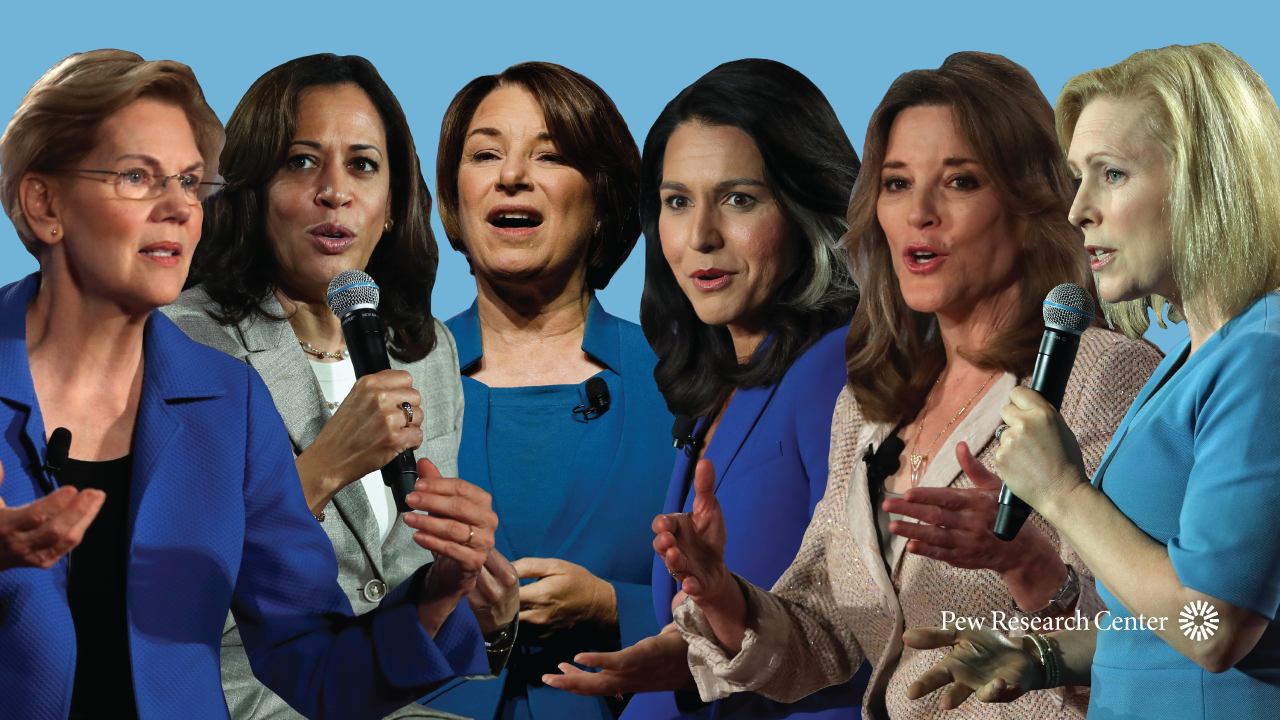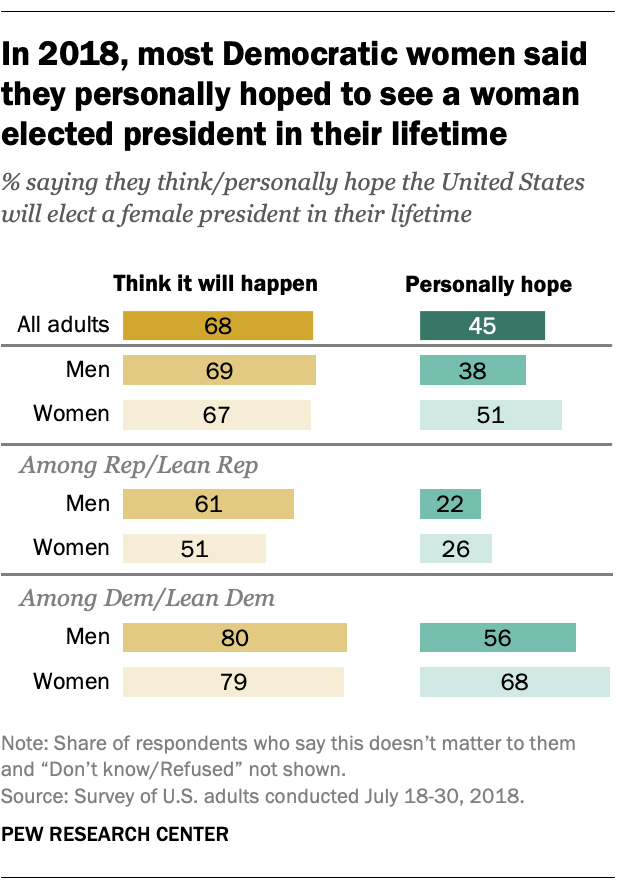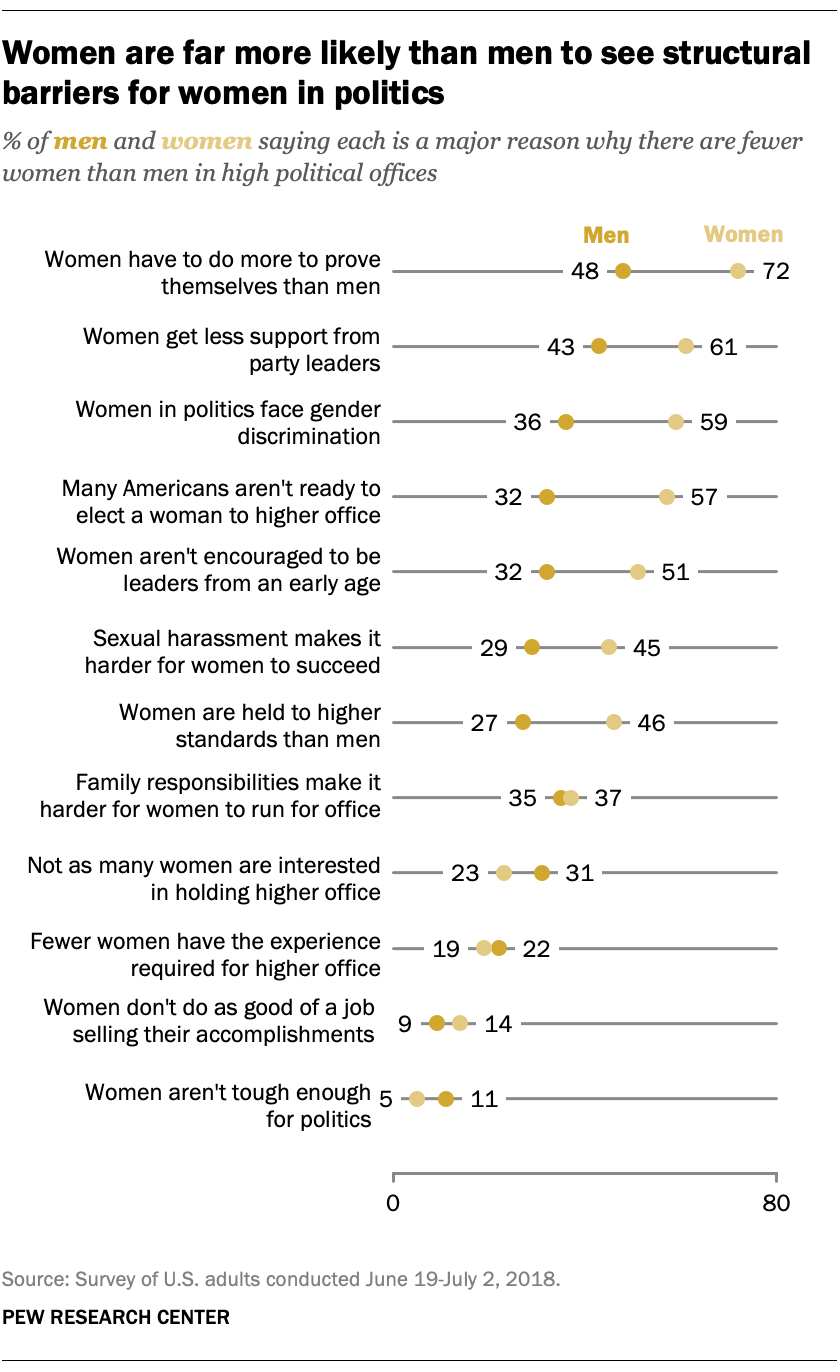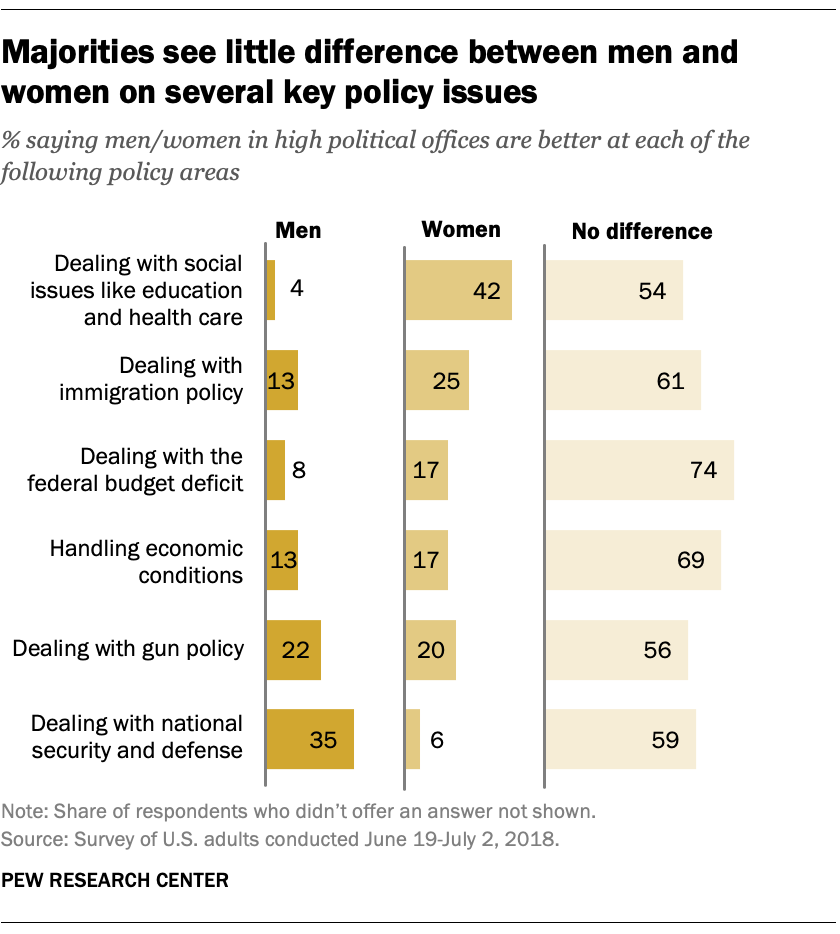
Three years after Hillary Clinton became the first woman to be a major U.S. political party’s nominee for president, a historic high of six women are running for the 2020 Democratic presidential nomination. But how do Americans feel about the prospect of a woman in the White House? And what barriers do they see for women in politics?
 A Pew Research Center survey conducted in 2018, before any of the current contenders announced their candidacy, found that more than four-in-ten Americans (45%) said they personally hoped a woman would be elected president in their lifetime. About half of all women (51%) said they personally hoped this would happen, compared with 38% of men.
A Pew Research Center survey conducted in 2018, before any of the current contenders announced their candidacy, found that more than four-in-ten Americans (45%) said they personally hoped a woman would be elected president in their lifetime. About half of all women (51%) said they personally hoped this would happen, compared with 38% of men.
Overall, Democrats and Democratic-leaning independents were more likely than Republicans and Republican leaners to say they hoped a woman would be elected president in their lifetime (63% vs. 24%). But Democratic women were particularly likely to say this (68% vs. 56% of Democratic men). And in a survey conducted this spring, Democratic women were more likely than Democratic men to express enthusiasm at the prospect of the party’s nominee being a woman.
Regardless of how they personally felt about it, majorities of Democrats and Republicans agreed that there would likely be a woman in the White House in their lifetime. Still, Democrats were more likely than their Republican counterparts to say they expect to see a female president in their lifetime (80% vs. 57%). Overall, about two-thirds of Americans (68%) said they thought the U.S. would elect a female president in their lifetime, down somewhat from 73% in 2014, but higher than the 54% who said this in 1996, when the question was first asked.
 While most Americans believed a woman would be elected president in their lifetime, the public sees barriers for women who aspire to top leadership positions in politics. A separate Pew Research Center survey, also conducted in 2018, found that two-thirds of Americans said it’s easier for men to get elected to high political offices, a view held by most Democratic and Republican women (82% and 62%, respectively) and Democratic men (75%). About half of Republican men (48%) said it’s easier for men to get elected to high political offices.
While most Americans believed a woman would be elected president in their lifetime, the public sees barriers for women who aspire to top leadership positions in politics. A separate Pew Research Center survey, also conducted in 2018, found that two-thirds of Americans said it’s easier for men to get elected to high political offices, a view held by most Democratic and Republican women (82% and 62%, respectively) and Democratic men (75%). About half of Republican men (48%) said it’s easier for men to get elected to high political offices.
Among the obstacles Americans – especially women – see for women in politics is women having to do more to prove themselves than men. About six-in-ten (61%) overall said this is a major reason why there are fewer women than men in high political offices. About half (52%) pointed to women getting less support from party leaders and 49% named gender discrimination as major reasons.
For the most part, public sees little difference between men and women in their leadership traits and competencies
 When asked whether men or women are better at dealing with a variety of policy areas, ranging from social issues like education and health care to gun policy or national security, a majority of Americans said men and women were equally capable. To the extent that the public saw a difference, more gave women the edge when it comes to dealing with social issues, while men were seen as better at dealing with national security and defense.
When asked whether men or women are better at dealing with a variety of policy areas, ranging from social issues like education and health care to gun policy or national security, a majority of Americans said men and women were equally capable. To the extent that the public saw a difference, more gave women the edge when it comes to dealing with social issues, while men were seen as better at dealing with national security and defense.
Democrats, particularly Democratic women, were far more likely than Republicans to say women in high political offices are better than men when it comes to dealing with social issues such as education and health care: 63% of Democratic women said women are better in this regard, compared with 40% of Democratic men, 31% of Republican women and a quarter of Republican men. For their part, Republicans were more likely than Democrats to say men in high political offices are better than women at dealing with national security and defense; 51% of Republicans said this, compared with 22% of Democrats.
Americans also largely see men and women in high political offices as no different in terms of key leadership qualities. In fact, on only one trait – being compassionate and empathetic – did a majority say one gender was better than the other (61% said female political leaders were better in this regard). More also said women were better at serving as a role model for children, working out compromises, being honest and ethical, maintaining a tone of civility and standing up for what they believe in, but majorities saw no gap between male and female politicians in most of these areas.
Men were seen as having something of an edge when it comes to being willing to take risks: 37% said male politicians are better at this, while just 9% said women are better and 54% said there’s no difference. To the extent that they saw a difference, Democrats were more likely than Republicans to say female politicians are better than men at most of these traits, while Republicans generally gave male politicians the edge.


